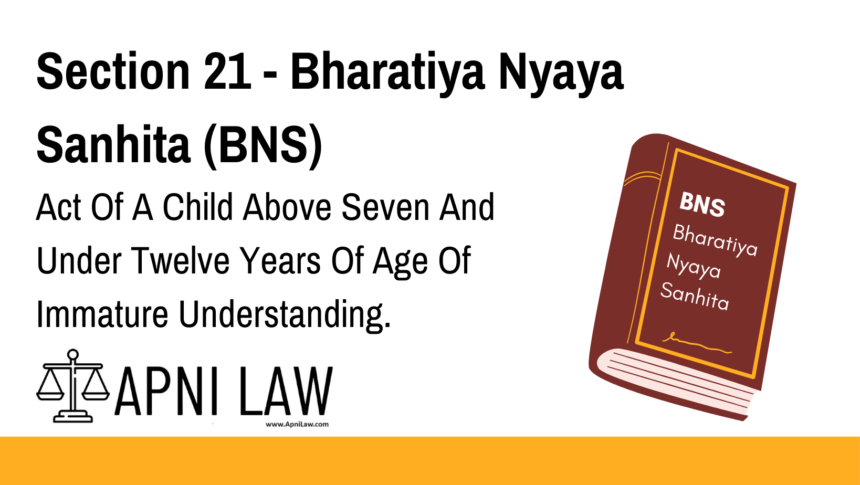Code: Section 21 BNS
Section 21
Nothing is an offence which is done by a child above seven years of age and under
twelve years of age, who has not attained sufficient maturity of understanding to judge of
the nature and consequences of his conduct on that occasion.
Explanation of Section 21 BNS
Section 21 of the Bharatiya Nyaya Sanhita (BNS), 2023, provides protection to children between seven and twelve years of age if they lack the mental maturity to understand the consequences of their actions.
Key Points:
- Age Limit: This section applies only to children between 7 to 12 years old.
- Requirement of Immature Understanding: A child will not be held liable if they lack sufficient understanding of their actions.
- Burden of Proof: The accused (child’s defense) must prove immaturity, unlike absolute immunity for children under seven years (covered under Section 20 BNS).
- Judicial Discretion: The court examines the child’s mental capacity, background, and circumstances to determine criminal liability.
Legal Principle Behind Section 21 BNS
This provision aligns with the legal doctrine of doli incapax, which means that a child is presumed incapable of forming criminal intent unless proven otherwise.
Illustrations of Section 21 BNS
Example 1: Theft by a 10-Year-Old Child
A 10-year-old boy takes a mobile phone from a shop without paying, unaware that it constitutes theft. The court assesses whether he understood the illegality of his act. If proven that he lacked such understanding, he will not be held criminally liable.
Example 2: Assault by an 11-Year-Old with Intent
An 11-year-old child hits another child with a stone, causing serious injury. If the prosecution proves that the child understood the consequences, he may be held liable under juvenile laws.
Common Questions & Answers on Section 21 BNS
1. Can a child between 7 and 12 years be punished under criminal law?
Not necessarily. If the child lacks the mental maturity to understand their actions, they will not be held liable.
2. Who proves whether the child was immature or not?
The defense (guardian/legal representative) must prove that the child lacked understanding.
3. Does Section 21 provide complete immunity like Section 20?
No. While Section 20 grants absolute immunity to children below 7 years, Section 21 applies only if immaturity is proven.
4. How does the court determine a child’s understanding?
The court evaluates factors such as:
- Psychological reports
- Expert opinions
- The child’s behavior and intent
- Circumstances of the offense
5. What happens if a child is found guilty?
If a child is found mature enough to understand their actions, they may face proceedings under the Juvenile Justice Act instead of regular criminal law.
Conclusion
Section 21 BNS ensures that children between 7 to 12 years are not unfairly punished for acts they do not fully understand. However, if they possess sufficient maturity, they may be held accountable under juvenile laws.
For more legal insights, visit ApniLaw! 🚀








